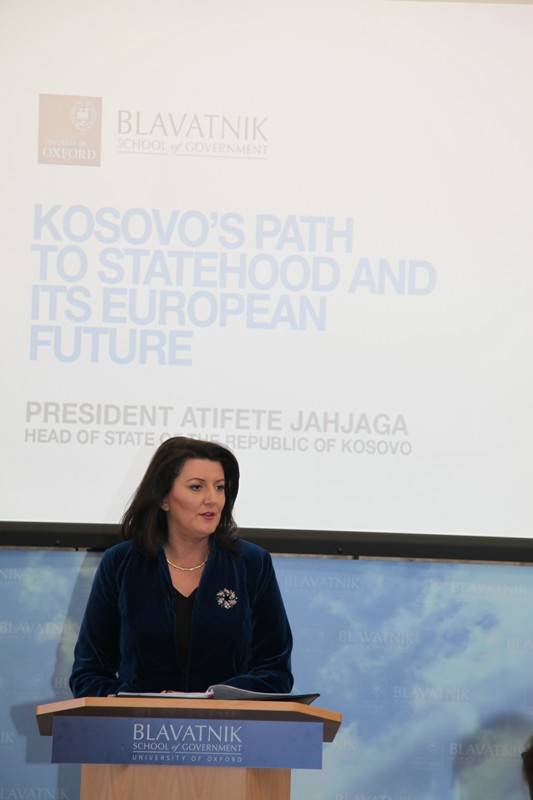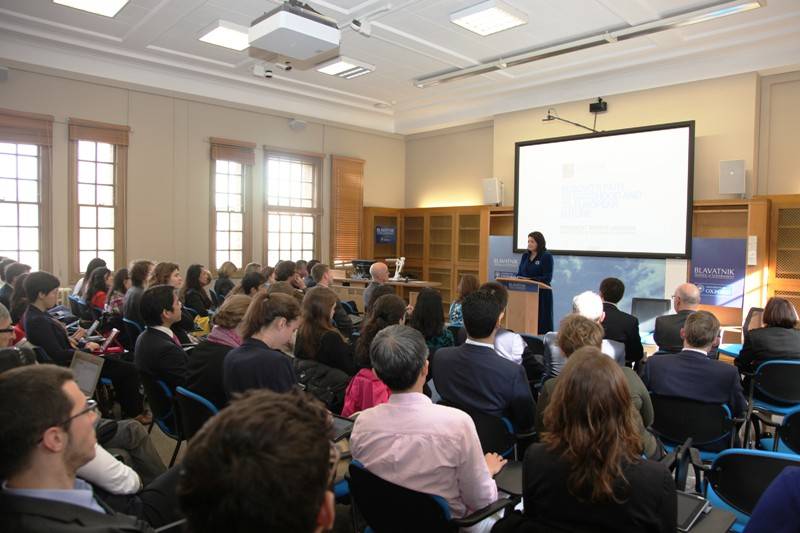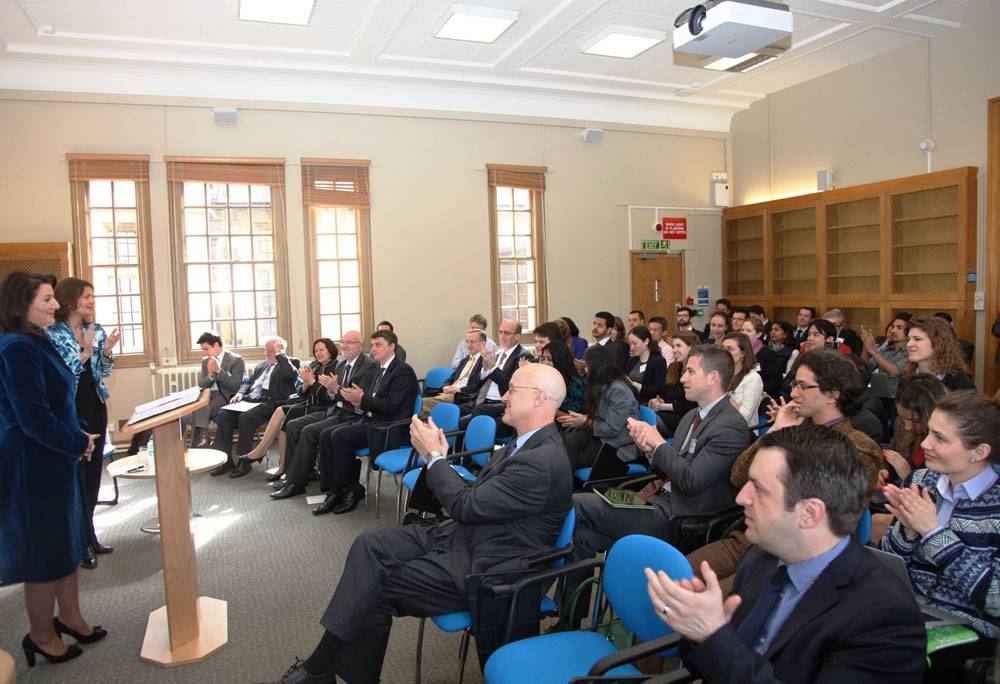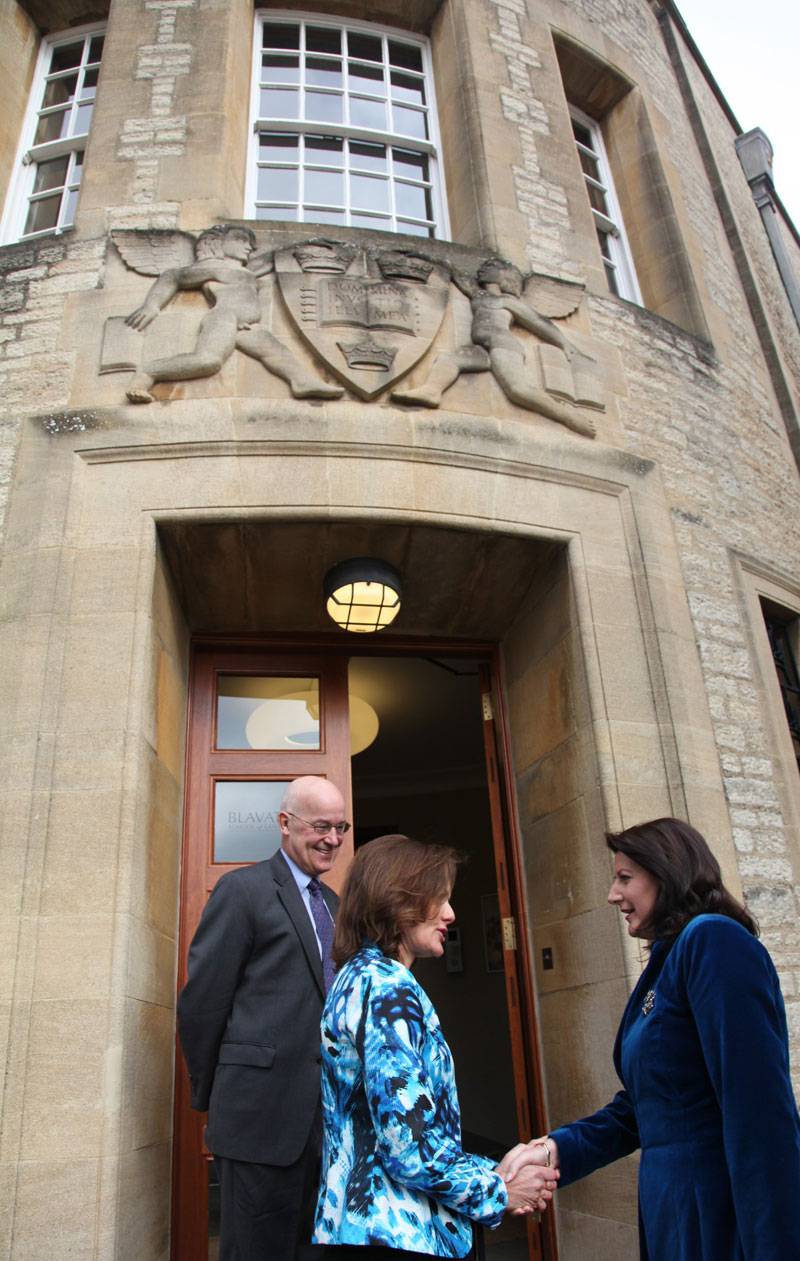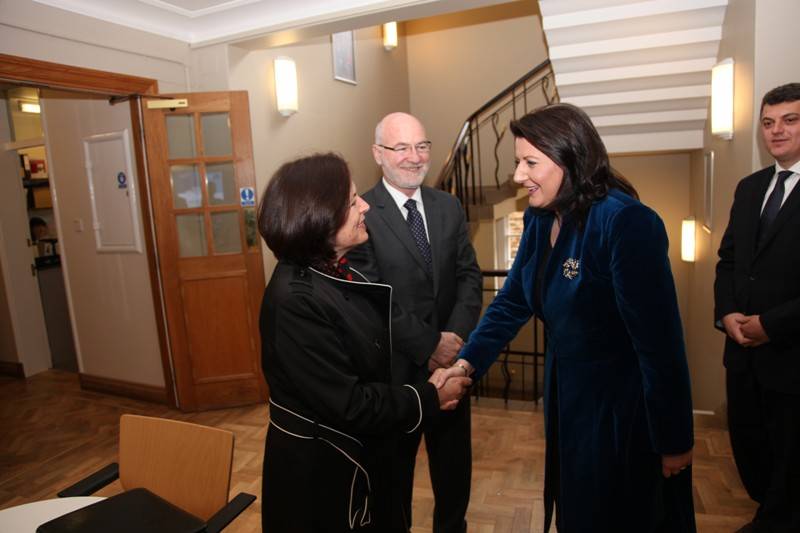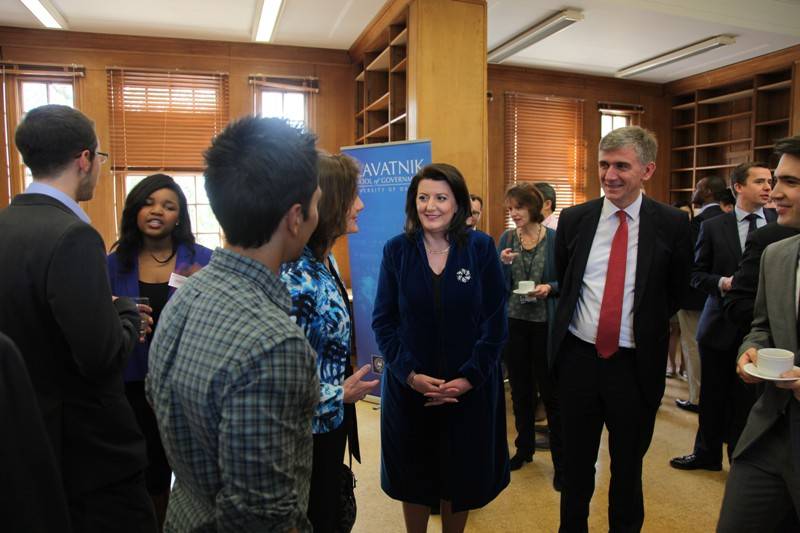I am honored to be here with you at this prestigious and renown University, to discuss jointly with you and the students, who are taking me back to my memories as a student, back to the most beloved days of youth, which for me and my country were difficult and filled with sacrifice.
The world of the student, the most vital part of the society and its avangarde, is the world of learning, of the attempt to bring together the reality and the imagination, of an entry into the real world willfully, enthusiastically and with the aim of making it more sustainable and better.
This is your world – and the future remains yours to shape.
I am pleased to be in the United Kingdom again, less than a year after I participated in the opening of the Olympic Games in London, one of the greatest ceremonies in the history of the Games. I am honored to be back in a country that has helped Kosovo in its most recent history – in liberating it and in supporting closely its state-building process. I trust that it will continue to be on our side on our path into the future.
I understand that most of you know of my country and its people not only through TV images, which have shown the violence, the suffering, the survival of repression and our fall and rise – but you have come to know it also through your friends, fellow students from Kosovo that you have met during the course of your studies here. You also know Kosovo through our attempts to prove that we are a country with clear aims and a clear vision to become part of the free world.
The wars in the Balkans have a long history and they may have been caused like elsewhere in the world, by different motives and territorial claims. The history of the Balkans is full of violent episodes, of conflicts and bloody battles that have sown hatred between people and have caused great cleavages. But ten years on the current Balkans, is slightly different, more gathered – with a vision for the future despite occasional sparks that are a consequence of the void between people.
Today the Balkans are not the Balkans of the last decade of the 20th century – it is richer with a new state, which is returning to the European values after a long departure.
You might have learned about Kosovo as the youngest country in the map of Europe, a small country, emerging from a war that left thousands dead and hundreds of thousands houses destroyed, lives shattered – but a country that has found the strength to move beyond pain and hatred.
My country as every country in Europe – built after decades of violence and suffering – is trying to secure its place among the nations of the world jointly with the Western Balkan region, which, as you may be aware, is described as sitting at the doorstep of Europe.
Kosovo is a country of five years. For nine years, before its independence was declared in 2008, Kosovo was run by international missions that have helped its rebuilding process and its renewal. It has gone through the emergency phases faster than other countries emerging from the war, although the continuing international civilian and military presence has been longer and stronger. Its democratic development is tightly linked to the international factor and its declaration of independence is a joint success of the international community and the sacrifice of whole generations.
The international assistance for Kosovo, starting with the 1999 NATO air campaign, that removed the dominance of the Serbian state from my country to the declaration of Kosovo’s independence has been significant in all the phases of its democratic development.
All the countries that have gone through the period of war need external assistance for their consolidation and to encourage their internal democracy. To build functioning institutions and to develop the framework of the political life. International assistance is crucial to economic renewal, but when this assistance is prolonged and is not structured it can become an obstacle to the development of a country and its society. This international assistance must be transformed in longterm investment by helping the creation of a sound business environment and a favorable climate for the entry of foreign direct investment. Otherwise it risks to become a longterm problem for the beneficiary country, impeding its path to progress.
The building of the state of Kosovo has been slow and difficult. We have gone through a process of discussions and negotiations, led by the United Nations, and the end result was not welcomed by all. Kosovo’s independence, declared in 2008, was challenged at the International Court of Justice, which gave the declaration of independence its seal of legitimacy. This long journey of completion of a project in the Balkans has secured the peace and stability and has paved the way to the region’s overall progress and democratization.
Distinguished participants,
Dear students,
Democracy is a process that develops and it requires inclusiveness and full engagement by all the layers of the society. It also requires strong and courageous leadership, transparent and accountable.
In a moment of political crisis in my country, I took the job as the President of Kosovo from my then position in the most trusted institution of Kosovo’s citizens, the Kosovo Police. In the short span of these last two years, I have met world leaders, with whom I have discussed not only the challenges of my country – but also all the processes through which the world is going through. Kosovo, from a place that has generated a crisis is transforming itself in a place that contributes to global solutions.
This is a new beginning for my country, a new challenge for the international scene and a test that we have passed in the process of our state-building.
The Republic of Kosovo is a country built on the civic principle, on equality between people, tolerance and understanding, which are elevated as societal values. It is a state that embraces ethnic, cultural and religious diversity that are embedded in its Constitution. A country that seeks to build its future without forgetting its difficult past.
I am meeting with you today, here in Oxford, at a time when my country is making strides to reach out the hand of understanding between the citizens of different ethnic communities. At a time when we are trying to overcome the distrust, sown during the period of our violent history, through a search of ways to coexist and cooperate.
We are meeting at a time when we are conducting an internal dialogue with our citizens while transmitting the messages that Kosovo is a country of great opportunities. The past cannot hold hostage our common future, determined to join the free nations. Albanians in Kosovo make the majority and the rest of the communities, Serbs, Turks, Bosniacs, Montenegrins, Roma, Ashkali, Egyptians and Gorani are an indivisible part of our society.
This multiculturalism has helped Kosovo deepen tolerance and understanding, strengthen respect and cooperation, by becoming an example beyond the Balkans. Kosovo’s institutions are inclusive, with representatives of all the communities that consider Kosovo their home.
Kosovo’s independence never represented a threat to any citizen of the country, but an opportunity, a chance toward development and progress. Independence was never an obstacle for the relations between people and countries, but a strong bond and a guarantor of security and peace.
The Republic of Kosovo is a promoter of good neighborly relations and a contributor to regional stability. We have built upon a policy of cooperation with all the countries of the region and we are responding to the invitation to contribute to the building of bridges between our own citizens.
We have ended the war and the hegemonic ideas in the Balkans. We have brought to an end divisions and redrawing of borders in the Balkans and today we’re focusing on the countries of the region that seek a better future for their citizens. We have ended the violence and we have opted for dialogue and agreements as the only way to find common solutions. Western Balkans is an indivisible part of Europe and it will get there with the help of the European Union again.
The Western Balkans needs more understanding and cooperation and more engagement by all, because only through mutual assistance can we move along in the path of the European integration.
But I want to share with you today not only the success, but also the challenges and the problems with which we are confronted in our state-building and integration process. I do not intend to hide them.
Our relationship with the Republic of Serbia continues to be cold and unfinished. We have finally reached an agreement to normalize our relations and establish peace and stability as well as mutual respect between two independent and sovereign nations.
We have entered into dialogue, after years of negotiations, to find an acceptable solution. In a dialogue that is facilitated by the EU and strongly endorsed by the US, but which does not touch upon Kosovo’s status. For us the dialogue is the best way to find common solutions and the agreement that was achieved is based upon the principle of normalization of ties between us, between two countries that have gone through a difficult period.
But, until our relationship is built upon distrust and big disagreements we will continue to hold the entire region, as well as our citizens, hostage. And until this relationship is undefined, vague and lacking respect, we will not prosper on our path to European integration. Not because Europe will not want us in, but because the obstacles that we will level against each other on our path will be huge and they will re-instate the clashes between different groups. I mentioned that democracy requires leadership and people that think about their country and the future of their citizens. A future that is different from the present and does not burden with the problems of today the next generations.
Therefore, in response to this need and in support to these processes that will lead to the improvement of the life of our citizens, of the normalization between our two states, in February I met with the Serbian President, Tomislav Nikoliq.
Regardless of how difficult and heavy, and at times overwhelming, our meeting marks the first step that the Presidents of the two countries have make possible the success of the dialogue. But for all of us, issues have been clear:
The processes in Kosovo are irreversible and not negotiable. Territorial claims for any part of my country are unacceptable. We have granted to all the citizens the right for local autonomy, based on the laws and the Constitution of Kosovo. This right has also encompassed the creation of new municipalities where non-Albanian minorities are in majority. Kosovo cannot allow the erosion of the present achievements and especially it cannot alter the reality of a multicultural country. Kosovo is sovereign in all its parts, including the municipalities in the north of the country. It is a country of all its citizens, wherever they may be, inside its determined borders.
Dear students,
Distinguished participants,
Kosovo’s integration and the integration of the Western Balkans into the EU is dependent upon us. Upon the will and our engagement to prove that we are an inseparable part of Europe and its values. The path of each state toward the EU is individual and unstoppable, regardless of the current obstacles. This path is very clear for Kosovo, and its citizens have rallied around it despite the ethnic divisions, over the goal of integration. But this path demands the common language of the 27 member states of the EU, 5 of which have yet to recognize Kosovo’s independence.
This new era requires cooperation and strong leadership to give an impetus to the region’s integration into the EU. And this is a good chance to take the right step so that the future generations will not judge us for the lack of courage and immature decisions. The integration into the EU means more than meeting the needed criteria because they relate to our development.
It means our readiness to change ourselves and to adapt to a set of values. It means our willingness to improve the wellbeing of our citizens. But above all, it means our readiness to cooperate in the regional level in different fields, in a joint effort to develop our economies, and especially in the field of security to fight organized crime, corruption and related crimes.
We want a united Balkans well into the European integration path. A region that will jointly built its European future!
In my country we face one of the biggest challenges – corruption – one of the biggest enemy to the development of a country. This war is now becoming more powerful and direct. We have no other choice but to defeat this ill. Kosovo is not an example of failure in the region, but it is turning into an example of continuous effort to defeat an enemy that may destroy it. And we shall win this war for the sake of the next generation and their future.
I have placed myself at the center of these efforts to fight corruption by creating the National Anticorruption Council, an inclusive mechanism. I stand at the center of this fight against corruption because the power of our country and the soul of our society are bigger than that of this negative phenomena.
Dear students,
Before I conclude this lecture I want to share with you another moment of the society I represent. I am the first woman President in the history of the entire region. An example of my society which has gone through difficult periods in its history, often described as a patriarchal society. I am a woman president at the helm of the young country of Kosovo, that crosses the gender barriers and recognizes the value of the woman in the society. In my country, women are represented at all levels, executive and legislative.
Gender equality should no longer be up for discussion and should not be a global issue. It is a human right and more – a recognition of the role of the woman in the society and an express of respect for her values. Her right to live a dignified life in equality is an undeniable right. No society will prosper without the recognition of this human right.
Distinguished participants,
I thank you for your attention and I wish you a successful completion of this academic year. I look forward to your questions.

